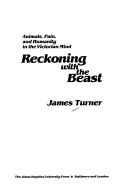The Johns Hopkins University Studies in Historical and Political Science
1 total work
Historian James Turner focuses on the great rise of Victorian concern for the humane treatment of animals, one of the most noteworthy flowering of such sentiment in modern times and one that engaged the support of the rich and the powerful, of church dignitaries, peers and ministers, and the queen herself. In delving into the history of animal rights, he also offers a fresh perspective on such varied aspects of Victorian culture as attitudes toward sex, pain, child labor, women, poverty, and science.
Turner draws on extensive researh in the archives of a animal protection societies, literature of the period, and controversial writings on the treatment of animals. He argues that the dual shocks of industrialization and urbanization helped produce a deeper emotional identification with the natural world. Scientists of the day, proclaiming that human beings were close kin to beasts, not only encouraged but demanded considerate treatment for animals, a sentiment that reached its liveliest expression in the antivivisection controversy. By the turn of the century, the author demonstrates, new conceptions of human nature adn heightened sensitivity even to the plight of lower life-forms were contributing to a new understanding of man's place in nature.
